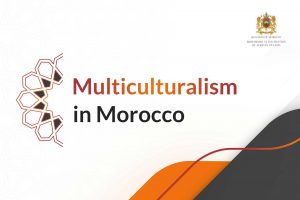Multiculturalism in Morocco

The Kingdom of Morocco draws its strategy in the field of religious freedom and multiculturalism from the dynamism of its longstanding historical experience, its religious tenets calling for moderation and tolerance, and its royal institution which protects religion and interacts with the milieu and with international and UN conventions. Throughout history and across generations, Morocco’s distinctive characteristic has been the mixture of cultures, religions, peoples and races. It has demonstrated its inspiring ability to deal with diverse migrations. Thus, the kingdom has, through its respect of specificities, provided space for coexistence and human interaction.
As a rich and diverse country, Morocco, with its spiritual backgrounds and culture, has strengthened its identity around a set of lofty ideals that are appreciative of the human being’s existence, social and intellectual, spiritual and legal aspirations, the consolidation of the principles of universality and human rights and the consolidation of altruistic values. It has thus demonstrated its ability to encompass the various cultures and human races, while preserving the specificities that enriched its human and non-material wealth.
In its Preamble, The 2011 Constitution provides for the religious and cultural diversity of the Kingdom, stressing: “to preserve, in its plentitude and its diversity, its one and indivisible national identity. Its unity, is forged by the convergence of its Arab-Islamist, Berber [amazighe] and Saharan-Hassanic [saharo-hassanie] components, nourished and enriched by its African, Andalusian, Hebraic and Mediterranean influences [affluents].”
In order to protect Morocco from extremism and to preserve its identity based on moderation and tolerance, a comprehensive, multidimensional strategy was developed in the field of religious discourse based on refuting the claims of extremism and urging imams and preachers to disseminate the spirit of tolerance and the rejection of immoderation, and to meet the various religious and cultural needs of citizens.
